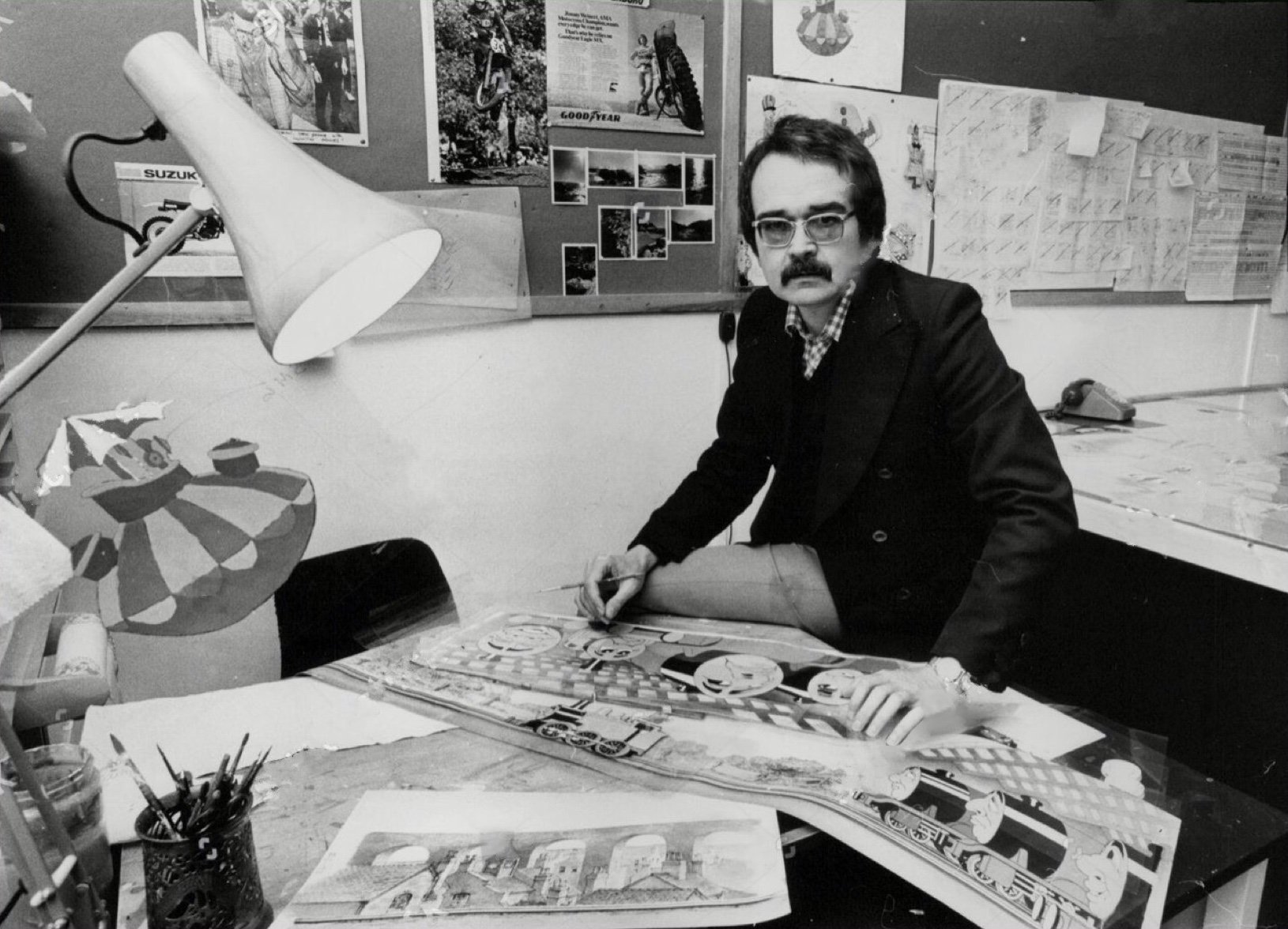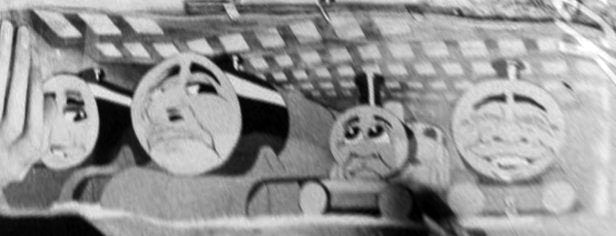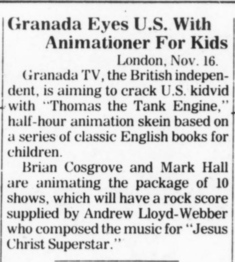Thomas the Tank Engine (lost pilot episode of unproduced 2D animated adaptation of "The Railway Series" books; 1976): Difference between revisions
No edit summary |
|||
| (13 intermediate revisions by 4 users not shown) | |||
| Line 5: | Line 5: | ||
|status=<span style="color:red;">'''Lost'''</span> | |status=<span style="color:red;">'''Lost'''</span> | ||
}} | }} | ||
''Thomas the Tank Engine'' is the title given to a failed animated musical television series in production throughout the 1970s that was based on ''The Railway Series'' children's books written by Wilbert Awdry. The project is notable for being conceived and partially written by composer and musical theatre impresario Andrew Lloyd Webber, famed for his numerous successful musicals such as ''The Phantom of the Opera'', ''Jesus Christ Superstar'', ''Evita'', ''Joseph and the Amazing Technicolour Dreamcoat'', and ''Cats'' among others. | |||
==History== | ==History== | ||
Following the unmitigated failure that was the 1953 pilot, no further attempts were made at adapting ''The Railway Series '' for several decades afterwards. This would change in 1973, when Webber, who had been a fan of the books since childhood, approached Kaye & Ward, the publishers of the books at the time, with the prospect of making a musical television series based upon them. Webber was a rising star at the time thanks to the aforementioned ''Jesus'' and ''Joseph'' musicals alongside his scores for films such as ''Gumshoe'' and ''The Odessa File'', so meetings were almost immediately established between him, Awdry, and Kaye & Ward managing director Stanley Pickard. Following this, specimen lyrics (written by Webber and frequent collaborator Peter Reeves) and draft contracts were quickly written, but there was apprehension between the parties almost immediately. If the contract presented were to be signed, then Webber's company would have gained complete control over all twenty-six ''Railway Series'' books written up to that point, all characters featured within them, and any other media featuring them that had been and would be produced. Webber and his attorneys argued that this was necessary to secure funding from American investors, but Awdry and Stanley were unwilling to agree to such terms. | |||
For a while afterwards, the ultimate fate of the project seemed uncertain, with Awdry going so far as to say that "Once the Americans get hold of it the whole series would be vulgarized and ruined."<ref>[https://www.sodor-island.com/the-tv-series Sodor Island Fansite page about the history of the television series.] Retrieved 08 Jun '20</ref> But eventually, an agreement was reached and Awdry received an advanced payment of £500. A pilot episode was then commissioned to Granada TV, which was animated by Brian Cosgrove, a British animator who would go on to create the popular animated series ''Danger Mouse''. The animation consisted of 2D cutouts of the engines moving across backgrounds in a style similar to that of ''Ivor the Engine''. The designs of the characters were based heavily upon those featured in the original books, but still with a unique aesthetic from Cosgrove. | For a while afterwards, the ultimate fate of the project seemed uncertain, with Awdry going so far as to say that: <blockquote>"Once the Americans get hold of it the whole series would be vulgarized and ruined."<ref>[https://www.sodor-island.com/the-tv-series Sodor Island Fansite page about the history of the television series.] Retrieved 08 Jun '20</ref></blockquote> But eventually, an agreement was reached and Awdry received an advanced payment of £500. '''A pilot episode was then commissioned to Granada TV, which was animated by Brian Cosgrove''', a British animator who would go on to create the popular animated series ''Danger Mouse''. The animation consisted of 2D cutouts of the engines moving across backgrounds in a style similar to that of ''Ivor the Engine''. The designs of the characters were based heavily upon those featured in the original books, but still with a unique aesthetic from Cosgrove. | ||
The pilot was screened in 1976, but it ultimately wasn't greenlit in spite of Webber's best efforts due to a lack of interest from the American market. The poor experiences with the pilot appears to have in no way dampened Webber's interest | The pilot was screened in 1976, but it ultimately wasn't greenlit in spite of Webber's best efforts due to a lack of interest from the American market. The poor experiences with the pilot appears to have in no way dampened Webber's interest in the books, as several of his future endeavours would be directly or indirectly inspired by them. In 1977, Webber would establish the Really Useful Group, a media company whose name is derived from the phrase "really useful engine" that was commonly used throughout the books. Later, in 1984, Webber would debut ''Starlight Express'', a musical about steam trains for which ''The Railway Series'' would serve as partial inspiration. That same year, a third televised adaptation of ''The Railway Series'' would premier on the ITV network, and the rest is history. | ||
To date, no footage from the 1976 pilot has surfaced. | To date, no footage from the 1976 pilot has surfaced. | ||
| Line 20: | Line 20: | ||
<gallery mode=packed heights=175px> | <gallery mode=packed heights=175px> | ||
ER8L1SrUUAApcvn.jpg|Cropped version of the above image showcasing the art style of the pilot. | ER8L1SrUUAApcvn.jpg|Cropped version of the above image showcasing the art style of the pilot. | ||
Variety1976-11-17.png|Article in a 1976 issue of ''Variety'' about the pilot. | |||
</gallery> | </gallery> | ||
===Videos=== | ===Videos=== | ||
{{Video|perrow =1 | {{Video|perrow =1 | ||
|service1 =youtube | |service1 =youtube | ||
|id1 | |id1 =foPFm5OrS7I | ||
|description1 =Scribbles to Screen's video mentioning the 1976 animated pilot (3:44-5:40). | |description1 =Scribbles to Screen's video mentioning the 1976 animated pilot (3:44-5:40). | ||
}} | }} | ||
==See Also== | |||
===Thomas & Friends=== | |||
*[[Thomas & Friends: All Engines Go (partially found test animation of reboot of British children TV series; 2019)]] | |||
*[[Thomas & Friends: Day of the Diesels (lost original cut of direct-to-DVD film; existence unconfirmed; 2011)]] | |||
*[[Thomas & Friends "Jack Jumps In" (found Alec Baldwin narration of British children's TV series episode; 2002)]] | |||
*[[Thomas & Friends "Series 7" (partially found original music of American dub of British children's TV series; mid 2000s)]] | |||
*[[Thomas & Friends "Series 12" (partially found Pierce Brosnan narrations of British children's animated series; 2008)]] | |||
== | ===Thomas the Tank Engine=== | ||
*[ | *[[Thomas the Tank Engine "Down the Mine" (partially found unaired pitch pilot version of children's TV series; 1983)]] | ||
*[[Thomas the Tank Engine "The Missing Coach" (partially found footage from unfinished episode of children's TV series; 1986)]] | |||
*[[Thomas the Tank Engine "Season 3" (found original Michael Angelis narrations of British children's TV series episodes; 1991)]] | |||
*[[Thomas the Tank Engine "Season 4" (found pre-recorded version of British children's TV series episodes; 1994)]] | |||
*[[Thomas the Tank Engine & Friends (partially lost deleted scenes of British children's TV series; 1984-2021)]] | |||
== | ===Other=== | ||
*[[Barry the Rescue Engine (lost production material of cancelled "The Railway Series" book; 1980s)]] | |||
*[[Jack and the Sodor Construction Company (miscellaneous lost media of spinoff series; existence unconfirmed; 2002)]] | |||
*[[The Sad Story of Henry (lost live BBC broadcast adaptation of "The Railway Series" books; 1953)]] | |||
*[[Storytime with Thomas (partially found Fox Family series; 1999-2000)]] | |||
*[[The Thomas & Friends Institute of Innovation (partially found informational short film; 2013-2014)]] | |||
*[[Thomas and the Magic Railroad (found deleted scenes of children's fantasy adventure film; 2000)]] | |||
*[[Thomas and the Magic Railroad (lost test footage of 3.5" character models for British children's TV series; 1995)]] | |||
*[[Thomas and the U.K. Trip & Thomas Number 1 (found Japanese "Thomas the Tank Engine" crossover TV special and music video; 1993)]] | |||
*[[Thomas the Tank Engine (found original illustrated edition of book; 1946)]] | |||
*[[Thomas the Tank Engine & Friends (found build of cancelled NES port of educational game; 1993)]] | |||
*[[Thomas the Tank Engine and Friends (lost build of cancelled PlayStation educational game; 1999)]] | |||
*[[The Three Railway Engines (found original edition of book; 1945)]] | |||
==External Links== | |||
*[https://ttte.fandom.com/wiki/Thomas_the_Tank_Engine_(1976) ''Thomas the Tank Engine'' Wiki page on the 1976 animated pilot.] | |||
==References== | |||
{{reflist}} | {{reflist}} | ||
Revision as of 08:31, 6 October 2022
Thomas the Tank Engine is the title given to a failed animated musical television series in production throughout the 1970s that was based on The Railway Series children's books written by Wilbert Awdry. The project is notable for being conceived and partially written by composer and musical theatre impresario Andrew Lloyd Webber, famed for his numerous successful musicals such as The Phantom of the Opera, Jesus Christ Superstar, Evita, Joseph and the Amazing Technicolour Dreamcoat, and Cats among others.
History
Following the unmitigated failure that was the 1953 pilot, no further attempts were made at adapting The Railway Series for several decades afterwards. This would change in 1973, when Webber, who had been a fan of the books since childhood, approached Kaye & Ward, the publishers of the books at the time, with the prospect of making a musical television series based upon them. Webber was a rising star at the time thanks to the aforementioned Jesus and Joseph musicals alongside his scores for films such as Gumshoe and The Odessa File, so meetings were almost immediately established between him, Awdry, and Kaye & Ward managing director Stanley Pickard. Following this, specimen lyrics (written by Webber and frequent collaborator Peter Reeves) and draft contracts were quickly written, but there was apprehension between the parties almost immediately. If the contract presented were to be signed, then Webber's company would have gained complete control over all twenty-six Railway Series books written up to that point, all characters featured within them, and any other media featuring them that had been and would be produced. Webber and his attorneys argued that this was necessary to secure funding from American investors, but Awdry and Stanley were unwilling to agree to such terms.
For a while afterwards, the ultimate fate of the project seemed uncertain, with Awdry going so far as to say that:
"Once the Americans get hold of it the whole series would be vulgarized and ruined."[1]
But eventually, an agreement was reached and Awdry received an advanced payment of £500. A pilot episode was then commissioned to Granada TV, which was animated by Brian Cosgrove, a British animator who would go on to create the popular animated series Danger Mouse. The animation consisted of 2D cutouts of the engines moving across backgrounds in a style similar to that of Ivor the Engine. The designs of the characters were based heavily upon those featured in the original books, but still with a unique aesthetic from Cosgrove.
The pilot was screened in 1976, but it ultimately wasn't greenlit in spite of Webber's best efforts due to a lack of interest from the American market. The poor experiences with the pilot appears to have in no way dampened Webber's interest in the books, as several of his future endeavours would be directly or indirectly inspired by them. In 1977, Webber would establish the Really Useful Group, a media company whose name is derived from the phrase "really useful engine" that was commonly used throughout the books. Later, in 1984, Webber would debut Starlight Express, a musical about steam trains for which The Railway Series would serve as partial inspiration. That same year, a third televised adaptation of The Railway Series would premier on the ITV network, and the rest is history.
To date, no footage from the 1976 pilot has surfaced.
Gallery
Images
Videos
See Also
Thomas & Friends
- Thomas & Friends: All Engines Go (partially found test animation of reboot of British children TV series; 2019)
- Thomas & Friends: Day of the Diesels (lost original cut of direct-to-DVD film; existence unconfirmed; 2011)
- Thomas & Friends "Jack Jumps In" (found Alec Baldwin narration of British children's TV series episode; 2002)
- Thomas & Friends "Series 7" (partially found original music of American dub of British children's TV series; mid 2000s)
- Thomas & Friends "Series 12" (partially found Pierce Brosnan narrations of British children's animated series; 2008)
Thomas the Tank Engine
- Thomas the Tank Engine "Down the Mine" (partially found unaired pitch pilot version of children's TV series; 1983)
- Thomas the Tank Engine "The Missing Coach" (partially found footage from unfinished episode of children's TV series; 1986)
- Thomas the Tank Engine "Season 3" (found original Michael Angelis narrations of British children's TV series episodes; 1991)
- Thomas the Tank Engine "Season 4" (found pre-recorded version of British children's TV series episodes; 1994)
- Thomas the Tank Engine & Friends (partially lost deleted scenes of British children's TV series; 1984-2021)
Other
- Barry the Rescue Engine (lost production material of cancelled "The Railway Series" book; 1980s)
- Jack and the Sodor Construction Company (miscellaneous lost media of spinoff series; existence unconfirmed; 2002)
- The Sad Story of Henry (lost live BBC broadcast adaptation of "The Railway Series" books; 1953)
- Storytime with Thomas (partially found Fox Family series; 1999-2000)
- The Thomas & Friends Institute of Innovation (partially found informational short film; 2013-2014)
- Thomas and the Magic Railroad (found deleted scenes of children's fantasy adventure film; 2000)
- Thomas and the Magic Railroad (lost test footage of 3.5" character models for British children's TV series; 1995)
- Thomas and the U.K. Trip & Thomas Number 1 (found Japanese "Thomas the Tank Engine" crossover TV special and music video; 1993)
- Thomas the Tank Engine (found original illustrated edition of book; 1946)
- Thomas the Tank Engine & Friends (found build of cancelled NES port of educational game; 1993)
- Thomas the Tank Engine and Friends (lost build of cancelled PlayStation educational game; 1999)
- The Three Railway Engines (found original edition of book; 1945)
External Links
References
- ↑ Sodor Island Fansite page about the history of the television series. Retrieved 08 Jun '20


